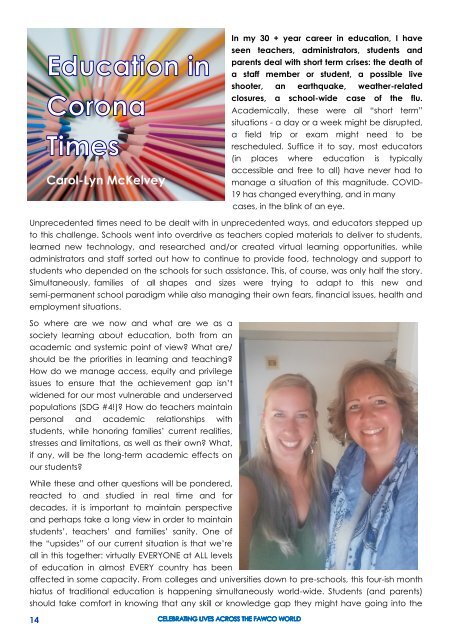Inspiring Women SUMMER 2020
You also want an ePaper? Increase the reach of your titles
YUMPU automatically turns print PDFs into web optimized ePapers that Google loves.
Carol-Lyn McKelvey<br />
In my 30 + year career in education, I have<br />
seen teachers, administrators, students and<br />
parents deal with short term crises: the death of<br />
a staff member or student, a possible live<br />
shooter, an earthquake, weather-related<br />
closures, a school-wide case of the flu.<br />
Academically, these were all “short term”<br />
situations - a day or a week might be disrupted,<br />
a field trip or exam might need to be<br />
rescheduled. Suffice it to say, most educators<br />
(in places where education is typically<br />
accessible and free to all) have never had to<br />
manage a situation of this magnitude. COVID-<br />
19 has changed everything, and in many<br />
cases, in the blink of an eye.<br />
Unprecedented times need to be dealt with in unprecedented ways, and educators stepped up<br />
to this challenge. Schools went into overdrive as teachers copied materials to deliver to students,<br />
learned new technology, and researched and/or created virtual learning opportunities, while<br />
administrators and staff sorted out how to continue to provide food, technology and support to<br />
students who depended on the schools for such assistance. This, of course, was only half the story.<br />
Simultaneously, families of all shapes and sizes were trying to adapt to this new and<br />
semi-permanent school paradigm while also managing their own fears, financial issues, health and<br />
employment situations.<br />
So where are we now and what are we as a<br />
society learning about education, both from an<br />
academic and systemic point of view? What are/<br />
should be the priorities in learning and teaching?<br />
How do we manage access, equity and privilege<br />
issues to ensure that the achievement gap isn’t<br />
widened for our most vulnerable and underserved<br />
populations (SDG #4!)? How do teachers maintain<br />
personal and academic relationships with<br />
students, while honoring families’ current realities,<br />
stresses and limitations, as well as their own? What,<br />
if any, will be the long-term academic effects on<br />
our students?<br />
While these and other questions will be pondered,<br />
reacted to and studied in real time and for<br />
decades, it is important to maintain perspective<br />
and perhaps take a long view in order to maintain<br />
students’, teachers’ and families’ sanity. One of<br />
the “upsides” of our current situation is that we’re<br />
all in this together: virtually EVERYONE at ALL levels<br />
of education in almost EVERY country has been<br />
affected in some capacity. From colleges and universities down to pre-schools, this four-ish month<br />
hiatus of traditional education is happening simultaneously world-wide. Students (and parents)<br />
should take comfort in knowing that any skill or knowledge gap they might have going into the<br />
14

















